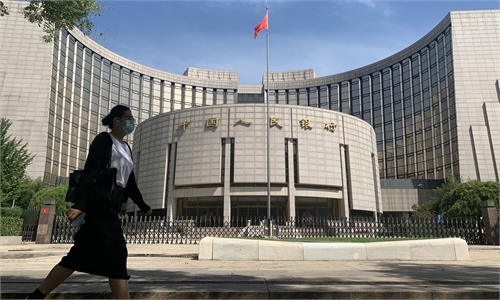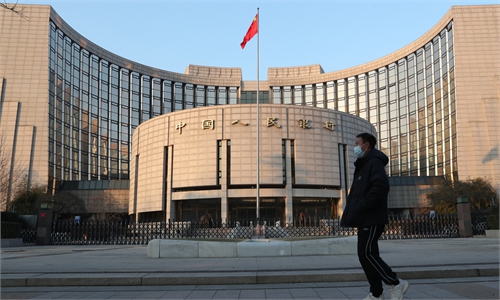China’s central bank to retain accommodative monetary policy, supporting real economy: governor

A worker handles packages at a warehouse in Jinhua, East China's Zhejiang Province on June 13, 2024 ahead of the upcoming "618" shopping festival. Major platforms including Tmall, JD.com and Pinduoduo are offering massive discounts and promotions for the festival, which serves as an important window on China's consumer market. Photo: VCG
The People's Bank of China (PBC), the central bank, will retain an accommodative monetary policy, strengthen counter-cyclical and cross-cyclical policy adjustments, bolster China's economic recovery and create a favorable financial environment for the country's economic and social development.
This stance will continue amid the country's steady economic recovery while it faces major internal and external challenges, PBC Governor Pan Gongsheng said on Wednesday at the 2024 Lujiazui Forum in Shanghai.
The PBC will focus on balancing relationships among short- and long-term factors, and between stabilizing growth and risk prevention, in the course of making due policy adjustments.
The PBC views maintaining consumer price stability while trying to promote a moderate recovery of prices as an important consideration, and it flexibly uses interest rates, reserve requirement ratios and other policy tools, Pan said.
The central bank will balance relationships among supporting the growth of the real economy and maintaining the healthy development of financial institutions, as well as promoting high-quality economic development while preventing and resolving financial risks.
Pan noted the importance of regulating domestic financial activities, as the PBC will take into consideration the possible spillover effects from other economies, resulting from their economic and monetary policy cycles.
China's monetary policy supports the substantial and qualitative growth of the real economy, and the growth rates of China's M2 and total social financing basically match the nominal GDP growth rate. This shows that the current monetary environment remains moderately loose, Zhou Maohua, an economist at China Everbright Bank, told the Global Times on Wednesday.
The current monetary policy stance has created a stable financial environment for the real economy, which is conducive for enterprises to obtain low-cost capital and promote investment and consumption, Wang Peng, an associate research fellow at the Beijing Academy of Social Sciences, told the Global Times on Wednesday.
The flexible use of monetary tools has effectively stimulated economic growth while encouraging enterprises to expand investment and production, as these measures have lowered the financing costs for domestic firms, said Wang.
Zhou stressed the importance of fully landing previously introduced measures and releasing policy dividends, while flexibly using different means such as aggregate tools and structural tools in conjunction with the implementation of a proactive fiscal policy, to better balance these relationships and support the economic recovery.
The PBC will gradually integrate treasury bond trading in the secondary market into its monetary policy toolbox, and is studying how to implement government bond trading with the Ministry of Finance, while stressing that government bond trading isn't quantitative easing, Pan said.
Zhou said that such a move will enrich the PBC's toolbox and is a complementary tool of open market operations. Under specific conditions, the central bank's bond trading in the secondary market helps stabilize liquidity, improves the efficiency of policy transmission and resource allocation, and better supports the development of the real economy, he said.
In addition, Wang noted that the potential implementation of PBC bond trading will provide a new liquidity management tool and a new channel for capital injection, leading to increased stability in the financial market and strengthened support for the real economy, as the new channel will help meet the capital demand of the real economy and further propel China's economic growth.



